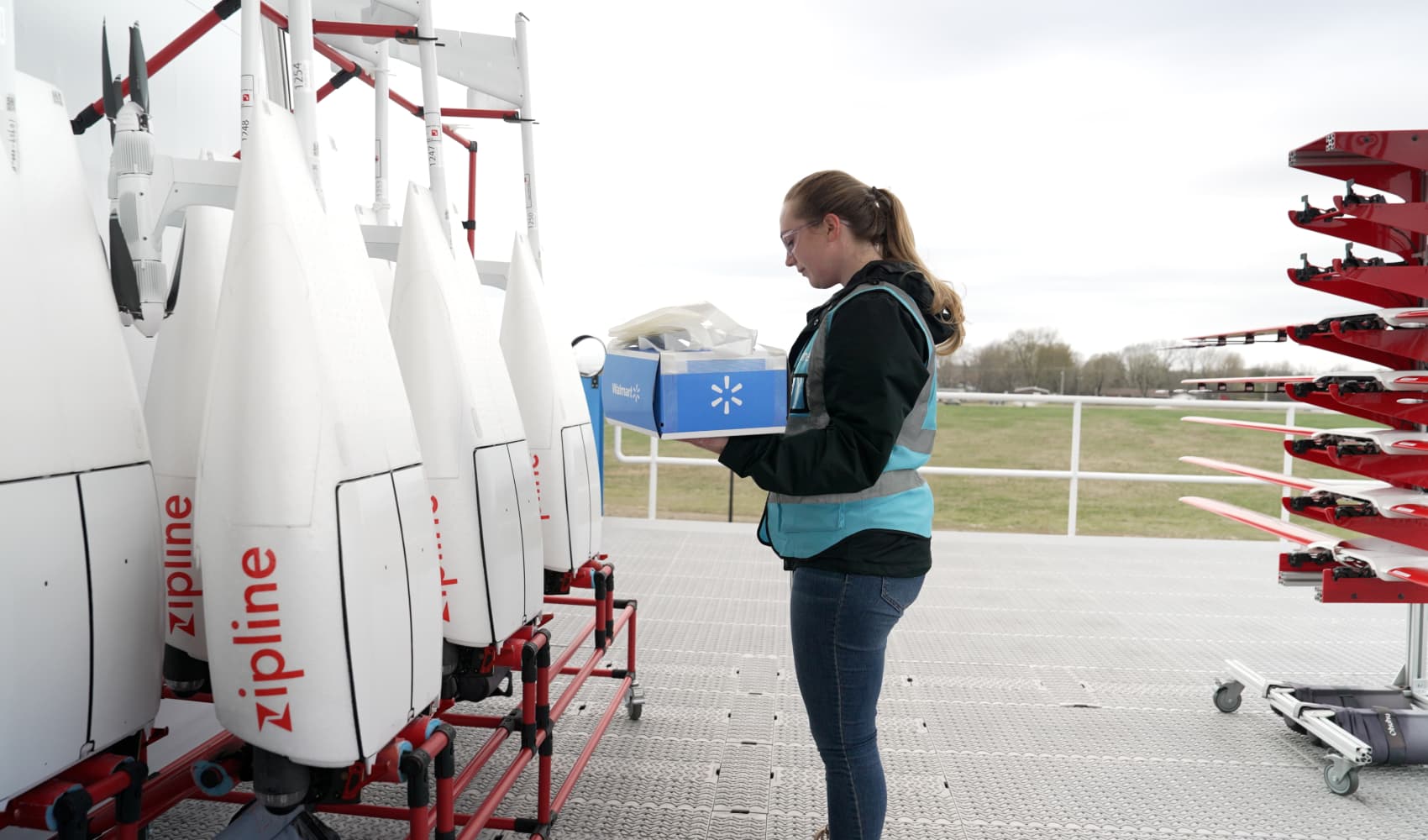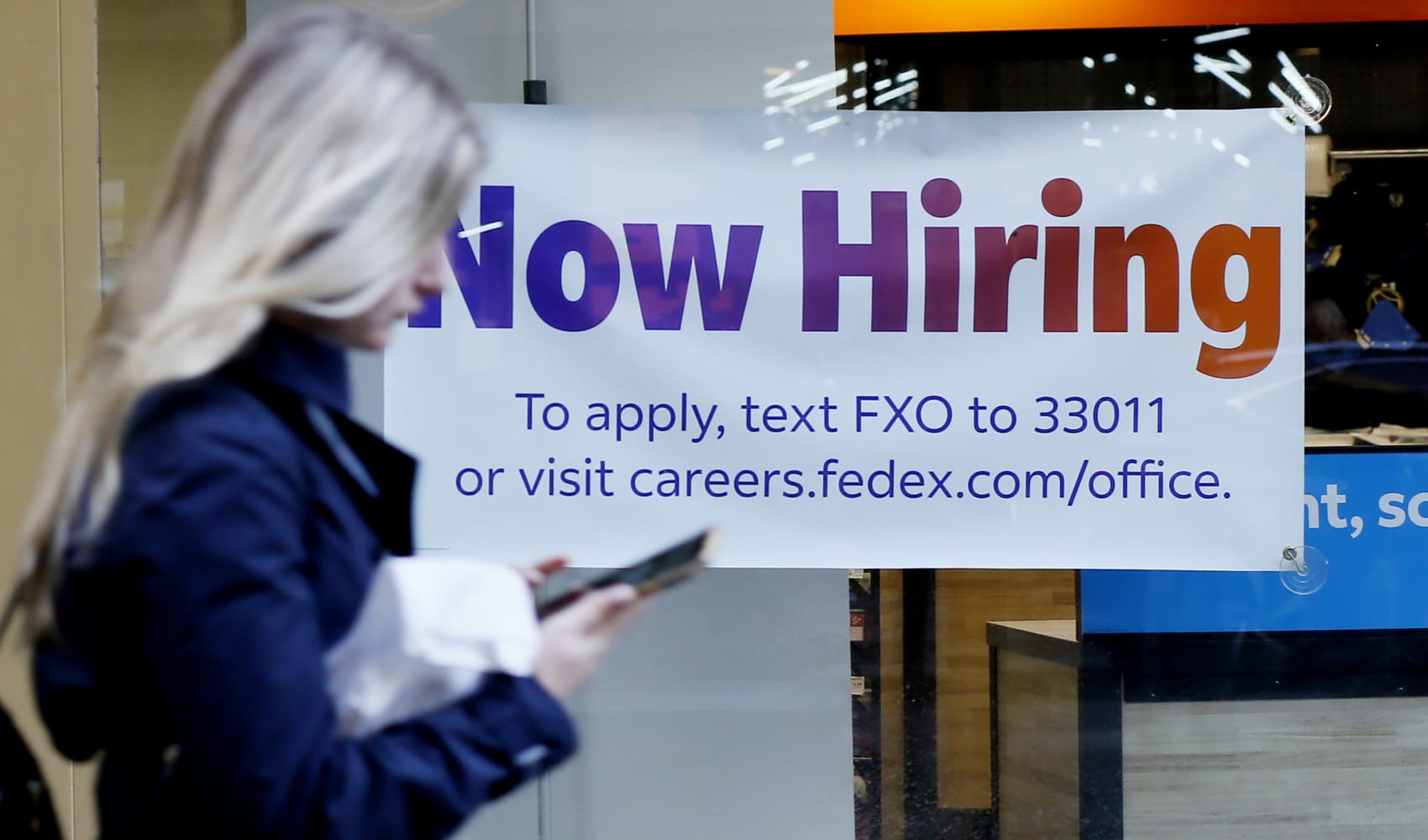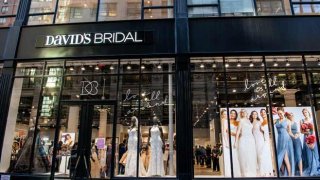
- David's Bridal CEO Jim Marcum said bridal gown demand has been resilient during the coronavirus pandemic.
- Marcum expects pent-up demand next year, as postponed weddings finally occur, or couples have a larger celebration after marrying earlier.
- The retailer's bankruptcy filing two years ago forced it to focus on building its digital business, and that has served it well during the health crisis.
- David's Bridal is launching a loyalty program Tuesday, which allows customers to earn rewards.
Demand for wedding dresses has proven resilient during the coronavirus pandemic, even as some couples postpone ceremonies or scale them down to a "minimony" in the backyard, said David's Bridal CEO Jim Marcum.
"That is the beauty about the industry — people are falling in love," he told CNBC. "It [a wedding] may be delayed, but it is not going away."
David's Bridal is one of many retailers trying to recoup lost sales after the health crisis temporarily shuttered stores — and threatens to do so again. Yet it's gotten an edge in an unusual way. It emerged from bankruptcy last year after reducing its debt load by more than $400 million. The company is now owned by lenders, including Oaktree Capital Group.
The bankruptcy pushed the wedding retailer to adapt to brides' changing tastes and reach them through digital channels, such as social media. Those changes have helped it navigate the pandemic. It began offering virtual consultations that allow brides to meet with a stylist by video call. And it added an augmented reality feature that brides can use to examine dresses' beading or stitching without stepping into a store.
Beyond these digital ways to shop in a socially distant manner, David's Bridal has adjusted its products. It's more than doubled its casual bride assortment with "little white dresses," jumpsuits and separates like sequin tops and tulle skirts. It is also selling a new wedding accessory: face masks made in the same fabric as bridesmaid dresses.
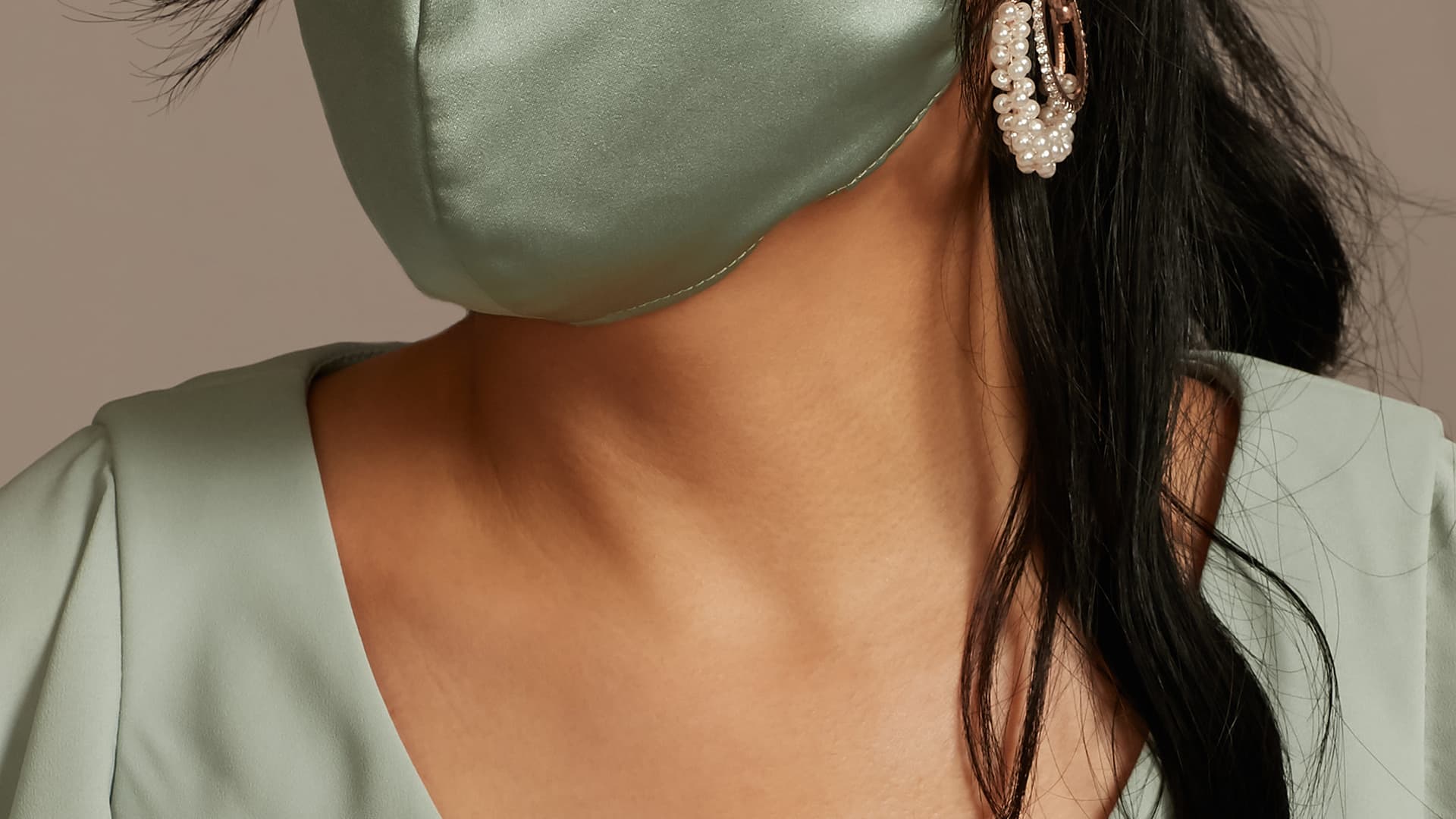
The approach is working, Marcum said. Although spending on other merchandise, such as homecoming and prom dresses, has dropped off, brides still spend an average of $600 on their gown — the same amount before the pandemic.
Money Report
The privately held company declined to share revenue figures. But it rang up about $715 million in sales in the year ended Dec. 29, 2018, Moody's Investor Services estimated. About 34% of its sales came from bridal gowns, 28% from bridesmaids dresses, 25% from accessories and 13% from other dresses, Moody's said.
David's Bridal sells a quarter of U.S. wedding gowns — a market share Marcum wants to grow.
Building brand loyalty
On Tuesday, the retailer will launch a loyalty program with rewards that range from a free bouquet to a honeymoon in Jamaica.
David's Bridal hopes the rewards will nudge customers to spend more and recommend it to others, said Kelly Cook, the company's chief marketing and information technology officer. Couples get coupons for signing up. They can collect points for all purchases linked to their wedding, from bridesmaid dresses to a dress worn by a wedding guest or the mother of the bride. Customers can also redeem rewards that aren't related to weddings, if they shop at David's for other kinds of dresses, such as for a college graduation or girl's night out, she said.
"We really want to own all of the dresses in her closet — not just the bridal gown," Cook said.
The loyalty program will kick off during a key season, she said. About 40% of engagements take place between Dec. 6 and Valentine's Day, according to wedding industry research.
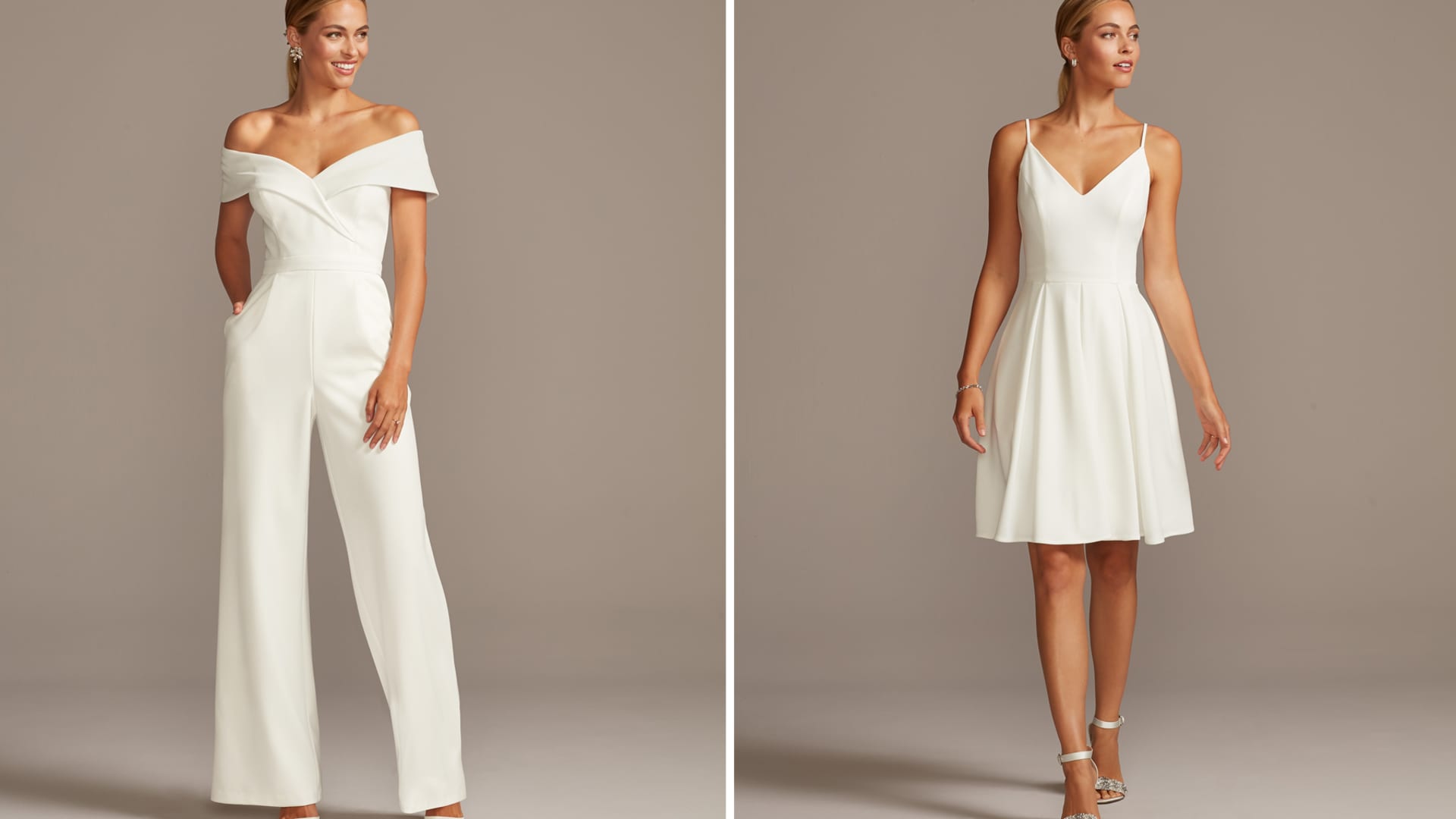
The wedding business — and brides' tastes — have changed significantly since the retailer began as a neighborhood bridal shop in Fort Lauderdale, Florida, in 1950.
Demographic changes have led to more Americans getting married later in life or living together instead of marrying, said Raya Sokolyanska, senior analyst at Moody's. Brides have shifted from poofy gowns and matching bridesmaid dresses as they opt for laid-back celebrations and destination weddings. And there's more competition from online retailers and nontraditional ones like Reformation and Urban Outfitters-owned Anthropologie.
"If you're having your wedding on the beach, you wouldn't have a cathedral train trailing behind you," she said.
As these changes were occurring, debt held David's Bridal back from making needed investments — a scenario that has played out over and over again in the retail industry.
Sokolyanska said David's Bridal has some advantages as it looks to build a profitable business: It has a well-recognized brand, a large assortment that accommodates brides of different sizes, the scale to drive down prices, and a large network of stores where brides can touch and feel a gown or where bridesmaids in different cities can order the same dress.
Navigating a health crisis
The company has nearly 300 stores in the U.S., Canada and the United Kingdom, with the vast majority in the U.S. Its stores went dark in mid-March, but most had reopened by the end of June. Some, such as stores in El Paso, Texas, and the U.K., have shuttered again because of new stay-at-home orders or tightened restrictions.
With Covid cases on the rise again, couples must weigh safety risks if they plan to bring together numerous households or ask guests to travel long distances. Some weddings have become superspreader events for Covid-19.
Even with safety precautions like wearing masks, quarantining or having the ceremony outdoors, the idea of throwing a lavish party — even if simpler or with fewer guests — may seem out of step during a time when some Americans have been out of work, gotten sick or even lost a family member or friend to Covid-19.
About 2 out of 3 couples had to postpone their wedding due to the pandemic, according to Brides magazine's annual American Wedding Study. About 36% chose to get married in a simpler way, but plan to have a reception later.
"What we're seeing is this rise of the micro-wedding, a wedding that's really intimate with fewer than 50 guests, which doesn't mean it's not as beautifully decorated and beautifully planned as they had anticipated — it's just smaller," said Roberta Correia, editorial director of Brides.
If brides slash the guest list because of the pandemic, they may actually spend more on their gowns, Sokolyanska said.
"A scaled-down ceremony should not hurt gown demand," she said. "In fact, I would think that the dress would get a bigger slice of that budget, if you're not spending on a 150-person wedding. You will just reallocate to other items in your budget."
"The gown is one of the important signifiers of a wedding," she said.
It also could fuel a couple's desire for a second party, or "sequel wedding," after the pandemic, Correia said. That could amplify the trend of buying two dresses, which is already an emerging fashion.
There are slip dresses or mini dresses for smaller affairs and transformative pieces that are designed to be worn in different ways. For example, dresses with a detachable long skirt can be worn for a casual ceremony and a formal reception.
On the other side of the pandemic, Marcum said he expects pent-up demand from couples who have delayed their weddings or want to celebrate again with a larger group.
"To us, that's an opportunity for a second dress — so we feel pretty good about that," he said.
The pandemic has underscored the importance of reaching prospective customers online, early in the planning process, as they scan Instagram for inspiration — and even before they get engaged, said Marcum.
The company offers free digital tools, including a wedding planning checklist, wedding website capabilities and an online universal wedding registry called Blueprint Registry that it acquired two years ago. Starting early this year, it added a new chatbot feature, called Zoey, that pops up in numerous places on the internet. The virtual stylist can answer questions and book appointments.

Rise of the 'minimony'
David's Bridal is also adapting to a new kind of wedding: the minimony.
Jumpsuits have been one of the top five search items every month since March on the company's website, an indicator that some brides are seeking different attire as they plan a more casual ceremony or have a wedding on Zoom.
More brides are coming to the retailer with tight timetables such as a wedding in the next 60 days, said Cook.
It's also sold bridal gowns to customers who plan to get married in late 2021 or beyond and those who have had to move their wedding a few times, she said. The company has had about 3,300 virtual appointments since it started offering that option in the spring.
One of its stylists is Kristina Cevallos, who works near Fort Lauderdale. For more than eight years, she has helped brides as they try on gowns in the dressing room. Now, she advises them by video call.
She said the virtual appointments have led to touching and funny moments. Some bridesmaids and mothers join the bride by video call, even as they're hundreds of miles away. Others bring their own glass of champagne to sip while looking for the perfect gown. And once, Cevallos tried on a dress for a bride, so she could see how it looked on a person.
When the bride finds the right dress, Cevallos keeps up a store tradition — ringing the bell and asking the bride to make a wish. Sometimes, she rings the bell a second time when the bride gets the dress in the mail and shows it off on another video call.
Despite meeting with brides virtually, Cevallos said she's developed closer relationships with them because of the pandemic. She said she emails and talks to them more frequently, sometimes as they tearfully delay their ceremony or look for reassurance about a wedding that looks very different than they had planned.
"They might have a vision from when they were a little girl of wearing a huge ballgown to now having to change into something for a much smaller venue," she said. "I try to still give them that special moment of realizing no matter what, it's still one of the most important days of your life."


